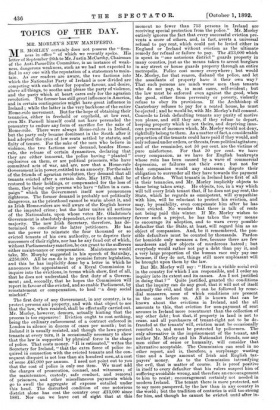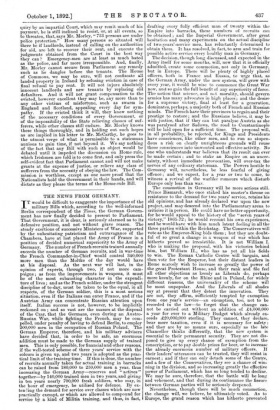TOPICS OF THE DAY.
MR. MORLEY'S NEW MANIFESTO.
MR. MORLEY certainly does not possess the " firm- ness in office " of which we recently spoke. His letter of September 26th to Mr. Justin McCarthy, Chairman of the Anti-Parnellite Committee, is an instance of weak- ness, dangerous weakness, such as we bad not expected to find in any one with the reputation of a statesman to main- tain. As our readers are aware, the two factions into which the Nationalist Party of Ireland is now divided are competing with each other for popular favour, and desire, above all things, to soothe and please the party of violence, and the party which at heart cares only for the agrarian revolution. The former has still great influence in America, and in certain contingencies might have great influence in Ireland ; while the latter is the very backbone of the entire Home-rule movement. But for the hope of obtaining their tenancies, either in freehold or copyhold, at low rent, even Mr. Parnell himself could not have persuaded the peasantry to endure any form of sacrifice for the sake of Home-rule. There were always Home-rulers in Ireland, but the party only became dominant in the South after it had adopted the cries of low rents settled by statute, and fixity of tenure. For the sake of the men who believe in violence, the two factions now demand, besides Home- rule, the release of certain dynamiters, declaring that they are either innocent, the police having " planted " explosives on them, or are political prisoners, who have committed acts of war, and are, now that a Home-rule Government is in power, entitled to an amnesty. For the sake of the friends of agrarian revolution, they demand that all tenants evicted after a certain date, May 1879, shall be restored to their holdings, or compensated for the loss of them, they being only persons who have " fallen in a cam- paign" which the Government itself now pronounces righteous. The former demand is probably not politically dangerous, as the priesthood cannot be warm about it, and as Irish Home-rulers are well aware of the English horror of the imputed crime ; but the latter unites all sections of the Nationalists, upon whose votes Mr. Gladstone's Government is absolutely dependent, even for a momentary majority. The new Irish Secretary, therefore, has de- termined to conciliate the latter petitioners. He has not the power to reinstate the four thousand or so evicted tenants of his own authority, or to deprive their successors of their rights, nor has he any fund out of which, without Parliamentary sanction, he can grant to the sufferers either maintenance or compensation. Maintenance would take, Mr. Murphy suggested in his speech of Saturday, £250,000. All he can do is to promise future legislation, and this he has implicitly done by a letter in which he announces the appointment of a Royal Commission to inquire into the evictions, in terms which show, first of all, that he does not understand the first duty of a Govern- ment; and, secondly, that he hopes the Commission will report in favour of the evicted, and so enable Parliament, by reinstatement or compensation, to heal " a deep social mischief."
The first duty of any Government, in any country, is to protect persons and property, and with that object to see that the law, when resisted, shall be effectually carried out. Mr. Morley, however, demurs, actually hinting that the process is too expensive ! Eviction ought to cost nothing. being the ordinary enforcement of a contract enforced in London in silence in dozens of cases per month ; but in Ireland it is usually resisted, and though the laws protect tenants at every turn, it is occasionally necessary to show that the law is supported by physical force in the shape of police. That costs money. " It is estimated," writes the Secretary for Ireland, " that the extra force of police re- quired in connection with the evicted tenants and the con- sequent disquiet is not less than six hundred men, at a cost of some £45,000 per annum. I need not point out to you that the cost of police is only one item. We must add the charges of prosecution, counsel, and witnesses ; of the maintenance, custody, safe conduct, and removal of prisoners, and other miscellaneous payments which go to swell the aggregate of expense entailed under this head. The disturbed condition of one notorious district alone has cost the country over £13,000 since 1881. Nor can we leave out of sight that at this moment no fewer than 753 persons in Ireland are receiving special protection from the police." Mr. Morley entirely ignores the fact that every successful eviction pre- vents a score of others, and, in fact, averts a universal refusal to pay rent, which could not be levied either in England or Ireland without eviction as the ultimate remedy for refusal or failure to pay. The £13,000 which is spent in " one notorious district " guards property in many counties, just as the means taken to arrest burglars in any street or house guards property through an entire metropolis. Police cost money everywhere ; but would Mr. Morley, for that reason, disband the police, and let the assailants of property have it their own way ? That such persons are much worse men than tenants who do not pay, is, in most cases, self-evident; but the law must be enforced even against the good, when the good, either from perversity or poverty, violently refuse to obey its provisions. If the Archbishop of Canterbury refuses to pay for a rented house, he must be ejected ; and he would be, with Mr. Morley's full consent. Concede to Irish defaulting tenants any purity of motive you please, and still they are, if they refuse to depart, keeping property which is not theirs, and depriving inno- cent persons of incomes which, Mr. Morley would not deny, rightfully belong to them. As a matter of fact, a considerable proportion of the tenants could have paid if they would, and only refused under orders, or threats, from political agitators ; and of the remainder, not 50 per cent. are the victims of pure misfortune. For that 50 per cent. we have every compassion, as we have for English bankrupts whose ruin has been caused by a wave of commercial depression, or failures not their own ; but not for that compassion would any statesman dispute their obligation to surrender all they have towards the payment of their debts. What tenants in Ireland have first of all is their tenancies, and Mr. Morley implicitly objects to. these being taken away. He objects, too, in a way which. will tell every Irish tenant that, if he does not pay rent, the State, which he regards as omnipotent, will sympathise with him, will be reluctant to protect his eviction, and may, by possibility, even compensate him after he has been evicted. No wonder that there is talk of rents not being paid this winter. If Mr. Morley wishes to favour such a, project, he has taken the very means to encourage its adoption, and to warn every possible defaulter that the State, at least, will regard him as an object of compassion. And, be it remembered, the pos- sible defaulters must be counted by thousands. Pardon for homicide only menaces a few, because there are few murderers and few objects of murderous hatred ; but everybody would rather not pay a debt than pay it, and a very large proportion of the human race only pay one because, if they do not, things still more unpleasant will be brought upon them by the law.
But Mr. Morley will say : "Here is a visible social evil in the country for which I am responsible, and I order an inquiry into its extent and its causes. Am I not justified in doing that ? " Quite justified, granted the conditions that the inquiry can do any good, that it will not of itself intensify the evil, and that it can be followed by reme- dial measures, none of which conditions are present in the case before us. All is known that can be known about the evictions in Ireland, and the all amounts to this, that eviction for non-payment of rent arouses in Ireland more resentment than the collection of any other debt; but that, if property in land is not to cease, and all purchasers of tenant-right not to be de- frauded at the tenants' will, eviction must be occasionally resorted to, and must be protected by policemen. The only alternative is the imprisonment of the tenant, and neither Mr. Morley and his Nationalist friends, nor any men either of sense or humanity, will consider that alternative acceptable. The Commission can send in no other report, and is, therefore, a surplusage wasting time and a large amount of Irish and English tax- payers' money. As to the Commission intensifying the evil, that is matter of course. It is proof positive in itself to every defaulter that his rulers suspect him of suffering avoidable wrong, and therefore an encouragement to him to resist ; encouragement certainly not needed in modern Ireland. The tenant there is more protected, not to say more pampered, by the law than in any country in the world ; but the tradition of centuries is still too strong for him, and though he cannot be evicted until after in- quiry by an impartial Court, which may remit much of his payment, he is still inclined to resist, or, at all events, so to threaten, that, says Mr. Morley, " 753 persons are under police protection." How many persons so situated will there be if landlords, instead of calling on the authorities for aid, are left to recover their rent, and execute the judgments obtained from the Court in the best way they can ? Emergency-men are at least as much hated as the police, and far more irresponsible. And, finally, Mr. Morley cannot secure from Parliament any remedy such as he dangles before the tenants. The House of Commons, we may be sure, will not confiscate all landed property in Ireland by refusing eviction in case of final refusal to pay rent. It will not injure absolutely innocent landlords and new tenants by replacing old defaulters. And it will not grant compensation to the evicted, however excellent they may be, any more than to any other victims of misfortune, such as swarm in England and Scotland, appealing every day for sym- pathy. If the evicted think it will, they know nothing of the necessary conditions of every Government, or of the impossibility of the State relieving classes of suf- ferers, while other classes still endure. Mr. Morley knows these things thoroughly, and in holding out such hopes as are implied in his letter to Mr. McCarthy, he goes to the utmost verge of what is permissible to a statesman anxious to gain time, if not beyond it. We say nothing of the fact that any Bill with such an object would be debated until it impeded the discussion on Home rule, which Irishmen are told is to come first, and only press the self-evident fact that Parliament cannot and will not make grants at the expense of justice, or relieve any class of sufferers from the necessity of obeying the law. The Com- mission is worthless, except as one more proof that the Nationalists hold the Government in their hands, and will dictate as they please the terms of the Home-rule Bill.



































 Previous page
Previous page